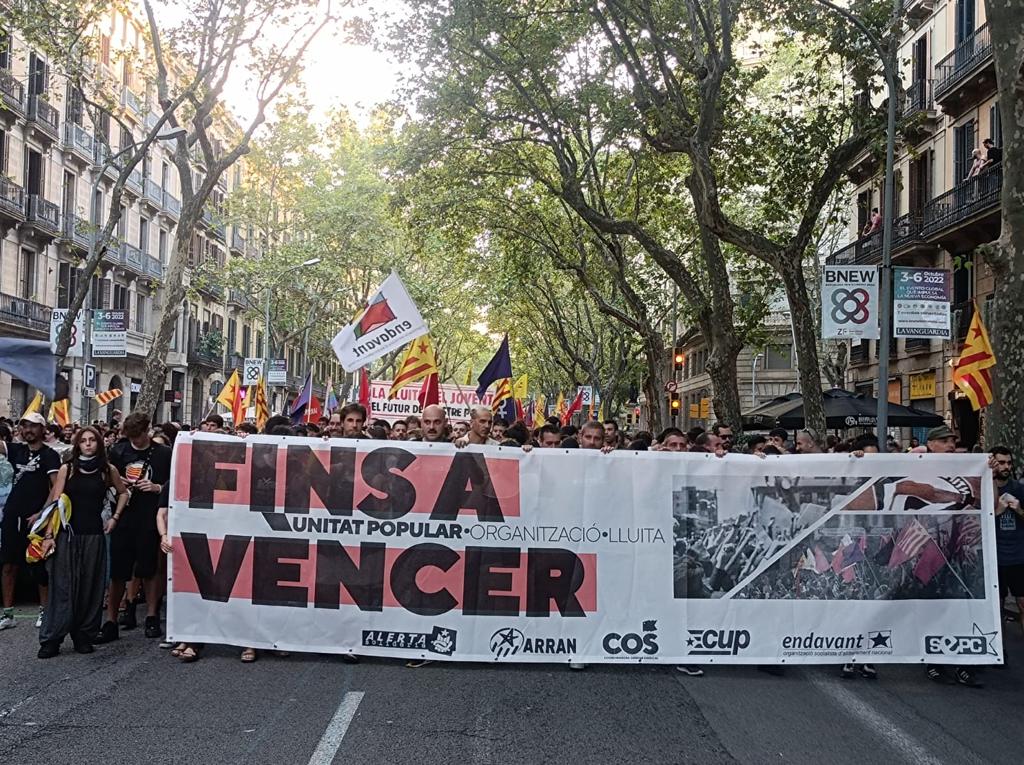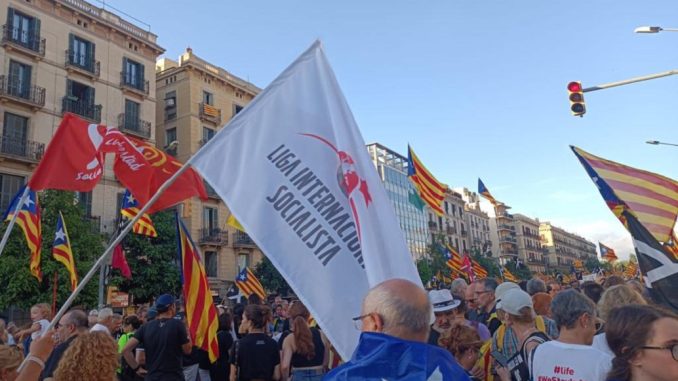
On September 11, thousands and thousands of people took to the streets again. There are some incontrovertible facts: the mobilization was larger than last year, expressed a huge discontent with the Govern and showed once again that the demand for self-determination has not said its last word. There are debates and crossed opinions about how to move forward. It is fundamental to promote a new attack for self-determination and to make the capitalists pay for the crisis. It is necessary to forge an extreme left front.
By Ruben Tzanoff
A massive demand sustained in time
According to the Guardia Urbana 150,000 people mobilized, according to the Catalan National Assembly (ANC) there were 700,000 people. The parties of the regime of ’78 and the media at their service have emphasized that the demonstration had less participation than in previous years. They did it to try to minimize the fact that more people marched along the Paral-lel Avenue to the Estació de França than last year, that there is still a massive demand for self-determination and that the Catalan mobilization is one of the largest and most sustained in time, both in Europe and around the world. From SOL we participated in the act for the punishment of the murderers of Gustau Muñoz, we shared the criticisms to the government in the general mobilization and in the one called later by the CUP, where we distributed flyers with our proposals.
Repudiation to the Government
The merit of the mobilization is magnified when we take into account that it was boycotted by President Aragonés and the leaders of Esquerra who did not attend. The Day expressed a clear repudiation of the Government shared by ERC and JxCat due to the fact that, with nuances and disputes in between, both parties seek dialogue with the oppressors, a course that has oriented the government’s bow towards a regent autonomy that moves further and further away from self-determination. It is no coincidence that banners have appeared raising “DUI or resignation” and “Traitors”. Political submission goes hand in hand with the attempt to unload on the backs of the working people the costs of the crisis of the capitalist economy.
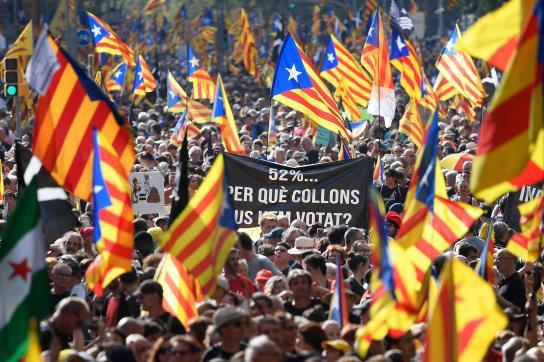
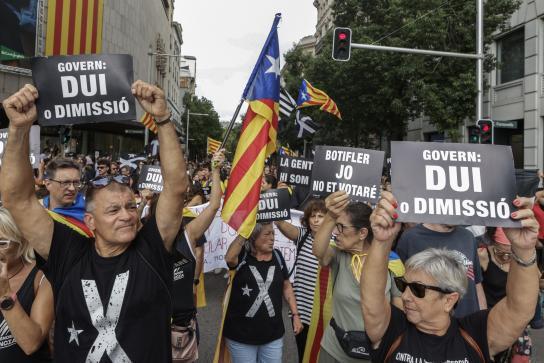
The last word is still unsaid
In spite of the repression and persecution carried out by the Spanish government and regime. In spite of the betrayals and maneuvers of the Catalan leaders of the majority parties, the generalized criterion of surrender and abandonment of mobilization as a tool to achieve freedom has not been imposed. In broad social sectors there is a demand to comply with the mandate arising from the 1-O Referendum. In Catalonia the last word has not yet been said. The daily debates on the different existing positions have also been manifested in the Diada.
The paths of the ANC and Ómnium
The main social organizations that promoted the Procès seem to distance themselves. ANC president Dolors Feliu said “Either you make independence or call elections”, launching a proposal “we have been in the streets for ten years. If this government and this parliament turn their backs, there is enough thickness in this country to make a civic list that serves to make independence. We will do it democratically. It is in our hands to change”. While the president of Ómnium Cultural, Xavier Antich, expressed himself in the opposite sense: “We will never give in to the populist temptation of anti-politics”.
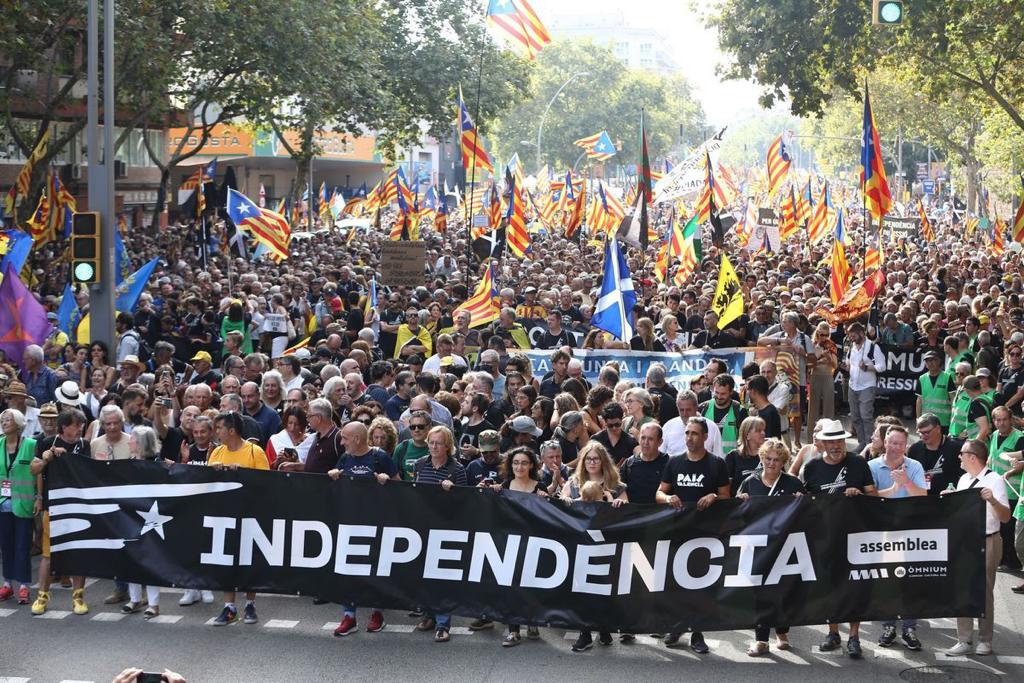
Crossed opinions
ERC and other reformist sectors have long argued that the way out is to “recreate unity”, “broaden the base” and “seek new complicities”. The ERC and JxCat “unity” was the one that suspended the independence a few minutes after declaring it, at the highest and most powerful moment of the popular mobilization, after which they intended to channel Catalonia towards a limited autonomy. The society in power is not unity but a violent dispute of apparatuses for their own interests. When ERC proposed “broadening the base” it meant exactly what it was doing: opening itself to agreements with the PSOE, en Comú Podem and other anti-independence forces. With this background, it is impossible not to be suspicious of the proposals to seek “new complicities” that are put on the table without mentioning the name of those to whom they are addressed.
A new onslaught is possible and necessary
Profound changes will not come about by respecting the margins of the regime of ’78, but from the massive mobilization and the general strike. They will depend on a clear call: the call for disobedience and the execution of the mandate of 1-O by the Catalan Republic. Self-organization is also possible, as demonstrated incipiently with the CDR and the preparation of actions for the freedom of political prisoners and against repression. New leaders are needed to raise a program for self-determination and amnesty, democratically debated and executed from below. The new complicities must be sought in the working class and the mobilized peoples in Catalonia, the Spanish state and the whole world.
For a front of the extreme left
In order to intervene in the class struggle and in the political processes, it is necessary to build a new political alternative, both in Catalonia and in the whole Spanish State. With what characteristics? That it be of the extreme left, anti-imperialist, anti-capitalist, for the self-determination of the peoples, for class independence, that breaks with the EU and does not yield an inch neither to the governments nor to the bourgeois regimes. With what program? With proposals that respond to the immediate and strategic needs, that is, for a government of the workers and for socialism. With what orientation? That it not only be an electoral formation, but a tool to support the struggles and to intervene in the daily processes, rooted in the workers and popular, student, feminist, pensioner and migrant movements. That it be located far from the old politics, from sectarianism and opportunism. That it delimits itself from the reformists and fights the right and the ultra-right. With what method? With common action, patient debate, respect for different opinions and political traditions.
The CUP can play a decisive role
The CUP has repositioned itself in the opposition, formulates correct criticisms and, from an anti-capitalist perspective, enjoys support in broad sectors. It is a political capital on the basis of which a call could be made to set up an extreme left Front. It would be a very positive step seen with great sympathy by the most consistent fighters, in the opposite direction of maintaining the agreements with ERC that allowed the investiture of Pere Aragonés and give continuity to the Legislature. Anticapitalists would also fulfill a progressive role if it were to pronounce itself in favor of a Front of this kind. The groupings that claim to be socialist and internationalist, like SOL, LI, CRT, CR and IR, have the challenge of taking steps to reverse the dispersion and advance towards the regroupment of revolutionaries.
